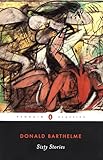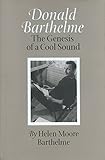A few months before Donald Barthelme’s “Game” appeared in the July 31, 1965, issue of The New Yorker, a cloud moved over Los Angeles. The cloud originated in Jackass Flats, Nevada, born from a nuclear rocket test. The Atomic Energy Commission wanted a “controlled excursion.” That excursion rode hundreds of miles before drifting into the ocean.
This was the era of Dr. Strangelove. A time when hundreds of kilograms of Uranium-235 went missing from a nuclear plant in Pennsylvania. The years when American B-52s secretly flew above Europe, hydrogen bombs at the ready, first strike only a moment away.
In a 1982 interview, Barthelme captured the sentiment that charged “Game.” His words could apply to the Cold War, as well as our painful present: “The doomsday clock has been set up a few notches, I gather. The way our present government is talking is absolutely mad.”
 “Game,” reprinted in Sixty Stories, is a paranoid, recursive, claustrophobic, uncomfortable tale. It takes place a single room. Shotwell and the narrator are two military officers stuck in an underground bunker “in Utah, Montana or Idaho” for 133 days, “owing to an oversight.” They are bored; they are frustrated. Shotwell is stubborn. He plays jacks but does not let the narrator join the game. The narrator wants the jacks, but Shotwell stuffs them into his attaché case.
“Game,” reprinted in Sixty Stories, is a paranoid, recursive, claustrophobic, uncomfortable tale. It takes place a single room. Shotwell and the narrator are two military officers stuck in an underground bunker “in Utah, Montana or Idaho” for 133 days, “owing to an oversight.” They are bored; they are frustrated. Shotwell is stubborn. He plays jacks but does not let the narrator join the game. The narrator wants the jacks, but Shotwell stuffs them into his attaché case.
This double game—a game of hiding a game—continues as they watch the console. They both are outfitted with .45s, along with hidden backup pistols, and are supposed to shoot “if the other is behaving strangely.” They are strange from the first word to the final word of the story, but strangeness is relative in Barthelme’s box of a story.
Their job is significant: If “certain events take place upon the console, we are to insert our keys.” They are to release the “bird,” the missile that will destroy a city. It is a hypothetical situation. It never happens. But it could, and its possibility is the story’s profluence. Barthelme’s recursive tale moves between several repeated signs—birds, guns, attaché case—but I am most drawn to its anomalies, its variables.
A great short story has a pulse. A great short story is tightly wound—no wasted words or breaths—but a great short story has new contours when we return to it. I first read “Game” in the basement of a university library, among the dark stacks of nearly discarded issues of Popular Mechanics. But now, even reading the story in a brightly lit classroom, I can still appreciate how the bunker’s “pale green reinforced concrete walls sweat and the air conditioning zips on and off erratically.” Anaphoric, with the occasional aside and quirk, his sentences are like incantations—liturgical, even (not surprising—although he later lapsed, Barthelme had a nostalgia for Catholicism cultivated by his years at St. Thomas High School in Houston; think James Joyce sneaking into the back of churches, sentimentality tempering one’s skepticism).
The narrator wonders if they are subjects of an experiment. Maybe. But we the readers are the experiment, so often, in Barthelme’s fiction. He pushes and strains the expectations we have for fiction. He asks us to play his game, with his rules. What is the syntax of a mind gone mad? Not just any mind—soldiers who can destroy cities. Mass destruction, “Game” suggests, is always in the wrong hands—because such power stains the soul.
 In Donald Barthelme: The Genesis of a Cool Sound, Helen Moore Barthelme said that her ex-husband claimed the story had touched an official nerve: “According to Don, ‘Game’ evidently stirred considerable interest among the military. He said that ‘Game’ had knocked them all for a loop in the Pentagon, but ‘not because it was true.’ He later told me that although the story caused a small furor, he heard nothing further about it.”
In Donald Barthelme: The Genesis of a Cool Sound, Helen Moore Barthelme said that her ex-husband claimed the story had touched an official nerve: “According to Don, ‘Game’ evidently stirred considerable interest among the military. He said that ‘Game’ had knocked them all for a loop in the Pentagon, but ‘not because it was true.’ He later told me that although the story caused a small furor, he heard nothing further about it.”
Neither Shotwell nor the narrator can sleep well at the end of “Game.” Two soldiers, close together and underground, cradle and rock each other to sleep. “Game” is a horror story. It is suffocating, and it is simple. We are in that bunker with these soldiers, and whatever postmodern games Barthelme was playing with language, the result is frightening. Sooner or later, the keys will be turned, and the bird will fly.
Image: Flickr/B4bees
The post Revisiting ‘Game’ by Donald Barthelme appeared first on The Millions.
from The Millions https://ift.tt/2KgiI6r
Comments
Post a Comment